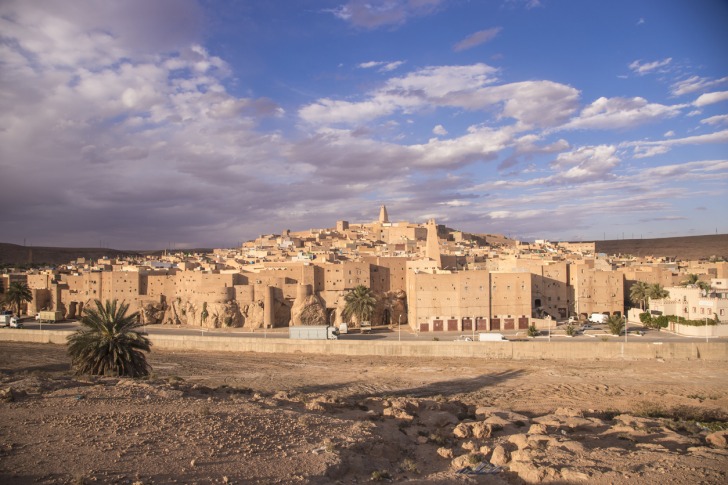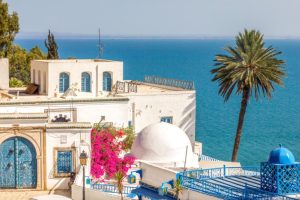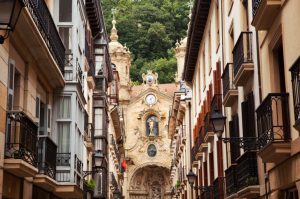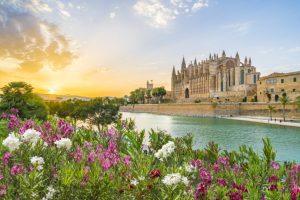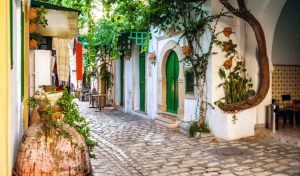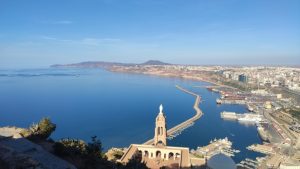If you have concerns about crime, safety, and are seeking the best Algeria travel tips, this is the guide for you!
Our guide provides an overview of the most common safety warnings and dangers in Ghardaia, Algeria, along with an update on some of the latest local crime statistics and significant threats to tourists.
Warnings & Dangers in Ghardaia

OVERALL RISK: MEDIUM
The overall travel risk for Ghardaia visitors remains at a moderate level for most travelers. Crime rates in the area have remained constant in the areas of petty theft, assaults, burglaries, and property crime. There are growing concerns about drug-related crime and high levels of scamming and corruption in this area. Travelers should take note of the elevated travel safety advisory alert for visiting areas of Algeria near the southern and Eastern border of Tunisia, where high levels of terrorism and kidnapping are present.

TRANSPORT & TAXIS RISK: MEDIUM
The transport and taxis risk for traveling in Algeria is medium in central locations and higher on the outskirts of towns. Algerian tourists can remain relatively safe by using local transport and taxi services that have been well-researched and vetted before arrival in the country. Travel advisories in the Sahara desert and near border countries show that land travel is unsafe and prohibited due to rising threats of violence and terrorism in nearby regions.

PICKPOCKETS RISK: HIGH
Although visiting most populated tourist attractions and destinations in and around Algeria is relatively safe for most globetrotters, Algerian tourists should note there are high levels of pickpocketing and petty thefts in all areas of the country. Use some of the recommended travel safety tips below to lower your risk as chances of becoming the victim of a distraction scam, or bump and grab pickpocketing are highly likely in Algeria's most crowded cities and towns.

NATURAL DISASTERS RISK: LOW
Although temperatures in and around the Sahara Desert can climb above one-hundred degrees, most weather in Algeria is tolerable with few instances of cataclysmic weather. Algerian explorers will be happy to note that the risk of experiencing natural disasters like hurricanes, tornados, floods, earthquakes, or volcanoes is relatively low in this region. There have been very few reports of flooding and mudslides in the region, which pose little threat to travelers.

MUGGING RISK: MEDIUM
The risks of being mugged while visiting Algeria can vary by location, so tourists need to be aware of their surroundings and the potential for danger in crowded and highly populated areas. Sightseers should remain vigilant when visiting highly populated or crowded areas. Highly populated and tightly packed areas are where most muggings and pickpocketing incidents occur.

TERRORISM RISK: MEDIUM
People traveling to Algeria should note that areas of the country are under a Do Not Travel advisory issued by the US Department of State. While most areas of the country are deemed moderately safe for residents and travelers, places in and around the Sahara Desert are dangerous and marked as prohibited for US travelers. There are pockets of terrorism and violence happening along the southern and eastern borders of the country, where it is inadvisable to travel.

SCAMS RISK: HIGH
Newcomers to Algeria should know that being scammed or pickpocketed are two of the most likely crimes they may face when visiting the country. Online crime statistics and safety reports show that scamming, corruption, and bribery are the most common crimes that happen here on an everyday basis.

WOMEN TRAVELERS RISK: MEDIUM
Solo female travelers should take special care to follow the instructions posted on the outer walls of each Algerian village they intend to visit. Many areas of the country are considered conservative and they have implemented special rules for dress codes, acceptable behavior, and etiquette which are emblazoned on the outside of the village walls.

TAP WATER RISK: MEDIUM
Online research shows that most travelers report no issues when consuming local tap water in Algeria. The tap water risk is moderate for most travelers and residents of the area. People with medical conditions and those with special considerations who require purified water should make arrangements for carrying and consuming bottled water during their trip.
Safest Places to Visit in Ghardaia
Algeria reports moderate levels of all crime types, including personal crimes against people, property crimes, thefts, assaults, and burglary.
However, people who take common sense safety precautions like keeping cash and valuables out of sight and only using local services with verifiable reviews are likely to stay safer.
The tourist attractions below are some of the most popular hotspots in the area and have been deemed secure locations based on reports by previous travelers.
- Old Town: Algeria’s tourists enjoy visiting the car-free zone of Old Town. This area features narrow streets lined with traditional houses built into the side of a mountain.
- Mezarene Mosque: Travelers can take advantage of religious sightseeing by visiting the Mezarene Mosque, a breathtaking 17th-century mosque that is the oldest standing mosque in Algeria.
- National Museum of Ghardaia: Local history buffs can learn more about the country’s M’Zab Valley region at the National Museum of Ghardaia. This small local museum features curated cultural attractions and has on-site security.
Places to Avoid in Ghardaia
Online safety data reports show that while most crime rates remain steady, there is an increasing problem with people using or dealing drugs in this area at an extremely high rate.
Algeria’s relatively moderate safety ends around 30 miles from its eastern border with Tunisia and within about 150 miles of its southern border with Mali.
There is currently a Level 4 Do Not Travel Advisory for borders and towns in and near the following areas surrounding Algeria’s Eastern and southern borders.
- Libya
- Mali
- Mauritania
- Niger
Local travel safety reports show that US travelers are currently prohibited from traveling to the areas above and from land travel across regions of the Sahara Desert.
Safety Tips for Traveling to Ghardaia
- Residents and Tourists Report Feeling a Sense of Safety When Walking Alone During the Day, But Not at Night.
- Beware of Moderate Crime Rates and High Levels of Corruption in All Locations.
- Hire a Reputable Tour Guide for Safer Exploration and Ease of Navigation.
- The Local Culture is Conservative – Dress Accordingly.
- The Walled Villages Have Signs on the Outside Indicating Acceptable Attire and Social Behaviors.
- Steer Clear of Petty Thieves and Pickpockets in Crowded Areas.
- Beware That Tourist Scams are High in Algeria.
- Always Carry Bottled Water When Traveling to Combat High Temperatures.
- Learn Conversational Arabic for Better Communication.
- Stay Hydrated and Wear Sunscreen Outdoors at All Times.
So... How Safe Is Ghardaia Really?
If you’re considering visiting or relocating your family to Algeria, you and your travel party should know that the safety of visiting most areas of Algeria remains relatively moderate.
Moderate safety levels hold true as long as you use common-sense travel safety precautions like staying in tight-knit groups and not traveling by yourself at night.
This north-central African country is currently peppered with pockets of crime that include high numbers of pickpocketing and petty theft and high terrorism risks for areas near the borders of Tunisia, Libya, Mali, and Mauritania.
- Rapidly rising levels of drug-related crimes, acts of terrorism, and kidnappings near the eastern and southern borders make parts of the country extremely dangerous and inadvisable to visit. The US State Department has issued a multifaceted travel advisory for Algeria and regions within the country.
- A level two travel advisory is currently in effect for most of the country. The southern and eastern borders and sections of the Sahara Desert have been deemed off-limits to American tourists.
- These areas are currently under a Level 4 Do Not Travel advisory because of the increasing number of active kidnapping and terrorism-related activities within the region.
Visit the US State Department website for the latest updates and travel advisories for people traveling in and around Algeria.
How Does Ghardaia Compare?
| City | Safety Index |
|---|---|
| Ghardaia | 48 |
| Algiers | 50 |
| Oran | 31 |
| Annaba | 44 |
| Tamanrasset | 30 |
| Atakor | 52 |
| Brussels (Belgium) | 60 |
| Shanghai (China) | 66 |
| Belize City (Belize) | 37 |
| La Paz (Bolivia) | 52 |
| Sao Paulo (Brazil) | 45 |
| Rio de Janeiro (Brazil) | 43 |
Useful Information

Visas
Most people traveling to Algeria will need to request a tourist Visa from the Algerian Embassy for official entry into the country. There may be fewer requirements for wayfarers visiting certain cities in the south where Visas are optional. Tourists arriving in the country by cruise ship will not likely need a Visa.

Currency
The Algerian Dinar, which is also known as the DZD, is the official currency of Algeria. Its symbol is DZD. Exchange rates from DZD to USD are favorable, and approximately 134.40 DZD is equivalent to one US dollar.

Weather
Algerian visitors should note that the country experiences a subtropical desert climate with few bouts of rain. Temperatures in the region can reach over one hundred degrees with little relief from the blistering desert heat relief. Locals typically stay indoors during the hottest parts of the day, from the middle of the day to the late afternoon.

Airports
US travelers should know that there are a limited number of direct flights from the US to Algeria. The most likely airport to fly into is the Boumediene Airport (ALG) from a connecting flight in Europe or the Middle East.

Travel Insurance
Americans traveling to Algeria should get travel insurance to protect their finances during the trip. Travel insurance can help offset the costs of trip cancellation fees, medical emergencies, and emergency evacuations.
Ghardaia Weather Averages (Temperatures)
Average High/Low Temperature
| Temperature / Month | Jan | Feb | Mar | Apr | May | Jun | Jul | Aug | Sep | Oct | Nov | Dec |
|---|---|---|---|---|---|---|---|---|---|---|---|---|
| High °C | 16 | 18 | 22 | 26 | 32 | 37 | 40 | 39 | 34 | 28 | 21 | 17 |
| Low °C | 5 | 7 | 10 | 13 | 18 | 23 | 26 | 26 | 22 | 16 | 10 | 6 |
| High °F | 61 | 64 | 72 | 79 | 90 | 99 | 104 | 102 | 93 | 82 | 70 | 63 |
| Low °F | 41 | 45 | 50 | 55 | 64 | 73 | 79 | 79 | 72 | 61 | 50 | 43 |
Algeria - Safety by City
| City | Safety Index |
|---|---|
| Algiers | 50 |
| Annaba | 44 |
| Atakor | 52 |
| Ghardaia | 48 |
| Oran | 31 |
| Tamanrasset | 30 |
